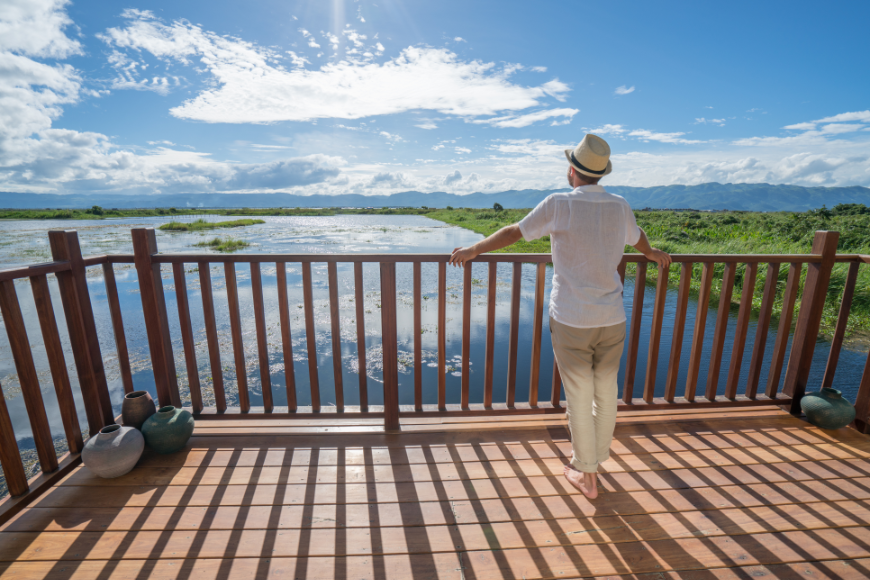Special Feature: Answers to all of the questions you never thought to ask about moving or retiring abroad—from Anywhere's CEO. Don't choose your new home based on a single vacation!

Behold the beautiful myth of living abroad—where the beaches are never crowded, and the weather is always perfect.
You’ve survived the winter! Spring is in the air, and that means one thing: Summer is almost here. It’s time to find excuses...Oops! We mean, ‘reasons’ for going outside, and sneaking a few minutes of daydreaming into the workday. May we be so bold as to make a suggestion? Why don’t you start thinking about that point in your life when every day will be a vacation? The real reason you get up for work in the morning? Retirement!
Still in school? Keep reading this article! It will remind you of why you’re working that crummy part-time job, and missing weekend parties with your friends. If you’re thinking of jumping on the ‘digital nomad’ bandwagon and telecommuting from overseas, there are tips for you too…
Question: Why do we spend 40+ years of our lives working?
Answer: For the blessed day when the alarm clock never has to go off again...Retirement!
Even if you love your career, there will come a day when it really hits you, “I won’t live forever. I did everything I was supposed to do, and now it’s my time. What have I always wanted to do? Where have I always wanted to go? What have I still not checked off of my bucket list?”
Whether you’re retiring this year, 5 years from now, or 35 years from now, times have changed. Not only is it difficult to spend your entire working life at one company, it’s almost impossible. The era of the retirement party with gold watch and cake has been gone, but that’s okay. It’s been replaced by something even better—a new attitude. Retirement doesn’t mark the end of your life, it marks a new era of freedom and success!
Retirement—what’s it all for?

You used to live for the weekend. Now, you can live for the everyday.
A lot of people think that retirement begins and ends with how much money you’ve saved. Obviously, like with most things in life, money is a crucial factor, but would you believe it’s only a small part of a successful retirement? What good is accumulating a lifetime of comfort and security if you don’t know what to do with it? The point of long workdays is to enjoy a happy life at the end of your career. What do you want to retire for?
If you’re like most people, you dream of seeing the world. Maybe you could never afford to travel. Even if you did enjoy the privilege, when was the last time you took a trip just for you? Not a study abroad, not a family vacation, not a business trip. We’re talking about seeing the world for the pure joy of experiencing a new destination:
That’s what you’re retiring for. Soaking up the pleasures of life, moment by moment because, for once, you’re not in a rush. You’re out of the rat race. You call the shots in your life. So, now is the time to decide what you want to do with it. Don’t just go abroad—retire abroad! You’re starting a whole new chapter in your life, so why not kick it off in a big way? Give friends and family a reason to visit you—the exciting friend, grandparent, aunt, or uncle living the enviable life overseas.
The Truth About Retiring Abroad

If you're retiring or moving abroad, think long and hard about how many years you will happily live in your new country.
Before you pack your bags, there are some important things that you need to know. Sure, we could tell you that a retirement abroad is as easy as packing a suitcase full of swimwear; that you’ll spend the rest of your days digging your toes into warm, golden sand—complete with a tropical drink in hand, cocktail umbrella and all. But you didn’t manage to successfully retire without learning a thing or to. You know it can’t be as simple as all that. You’re just not sure why. Anywhere has the answers. We’re not afraid to tell you the truth about retiring abroad…
Anywhere’s very own CEO Zach Smith is sharing his knowledge as the owner of a successful, yet ethical, premier digital travel agency. He's answering the questions you have about retiring or moving abroad:
-
- Which countries should I consider?
-
- What will I do every day?
-
- Am I going to have to become fluent in a new language?
-
- Can I navigate the cultural differences?
-
Does retiring abroad or moving abroad even make sense for me; should I go on trips instead?
Let’s look at one of the most important parts of retiring abroad or moving abroad—the drawbacks! The last thing you want to do is spend your life’s fortune, or your entire youth, planning for the day you permanently pack your bags for a tropical isle, only to discover that it’s totally wrong for you. Same scenario even if you’re considering uprooting your life mid-career. As the saying goes, “You don’t know what you don’t know.” Here’s a travel CEO’s take on why being a permanent vacationer is not always a vacation:
What should I be most concerned about regarding retiring abroad?
Whether or not you are satisfied with your decision after one year, two years, three years, four years, five years... You really have to know yourself and the community in which you are going to live. [You need to] ensure that you’re in it either for the long-term or for enough time that it made the effort [of an international move] worth it. Maybe it’s not permanent. You could decide to stay for only three to five years, but the point is to choose the right location so you feel that you are able to achieve that goal that you have for yourself.
In order to make that happen, it is best to spend time reading up on the different cultural dynamics, hearing stories from other expats, and actually spending time in two to three locations—probably for three weeks to a month, maybe more. It is nice [and important] to really get into a rhythm before making the choice to move. I think it would be rather naïve, and most likely, a catastrophic mistake to show up and buy a place after being there for only three to four days.
You can have a feeling that a place feels right after a few days, but you really need to test that feeling out. That means doing your due diligence by spending three weeks to a month there. Make new friends in the area, and try to figure out what part of the town you could imagine yourself living in. You have to figure out what your routine might be if you lived in that certain place. Going through that testing phase, I think, is a requirement in order to make sure that the decision you are making is based on sound judgment.
What are the worst reasons to retire overseas?
The Weather
One of the worst reasons to retire overseas is to do it because you want to be in a place with ‘good weather.’ [Think about it,] you visit a place during a specific time of year because somebody told you that you will experience the best weather. [What about the rest of the year?] However nice the weather is a certain time of the year, remember it can also be the complete opposite during another season. Weather is a big factor when people make a decision to move to a different country, but it can also be a letdown. The culture and the community are more practical factors, with bigger benefits.
The Beach
A lot of people want to retire on the beach, or live on the beach, and that is great. The beach is beautiful, and it has a lot of things that are attractive, but it is better suited for visiting rather than living. The air on the beach is salty, which makes properties wear down. The sun is normally very hot on the beach, which gets uncomfortable. So, if you live on the beach, you might find yourself constantly looking for shade.
There is not a lot of agriculture that can be supported at the beach [goodbye vegetable garden]. Vendors come to the beach on trucks in order to sell to the people there. That adds to the hustle and bustle brought about by visitors that go to the beach all the time. It is not ideal to be at the beach the whole year because it starts to wear on you after a while. I’ve known a lot of people who ended up being more stressed out than any other time in their lives because they [thought] that moving overseas and living on the beach was going to be perfect. Nothing is perfect, not even the beach.
Do I need to renounce or relinquish my US citizenship or get dual citizenship to move or live abroad?

Don't throw out that laptop yet! You'll still have to pay taxes and conduct other business whilst abroad—especially if you've moved, but haven't retired yet.
Under most circumstances, having dual citizenship is the preferred way to go about moving abroad. Formally renouncing your citizenship is actually a complicated process. Dealing with the IRS is never fun and pre-paying future taxes in order to relinquish citizenship is a significant burden vs. continuing to file taxes as a US citizen, despite living abroad.
[Also,] there are some tax advantages to living abroad. Most notably, if you’re out of the country for more than 330 days, you will get a tax exemption called the Foreign Earned Income Exclusion. In a nutshell, if you have a low income then you are not going to be paying U.S. taxes. The Foreign Income Exclusion stops a little over $100,000 USD in earned income for a single U.S. taxpayer. What’s nice about it is that you pay 0% on earnings up to the amount of the exclusion, and then the money earned above that is taxed at a lower rate.
This is what I understand, but it’s a financial perspective that is best to revisit when you are closer to making your decision. [Bottom line], you do not need to renounce or relinquish your U.S. citizenship in order to live in another country. Making this decision is not something to be taken lightly, as revoking your citizenship is a big deal. Review all matters tax related; rules change, and [so might the way] your income arrives—W-2, investment, foreign payroll... all are factors that should be considered and advised by a tax professional.
Part II
Don’t let any of this information get you down, because you’re now much savvier than many of your friends and colleagues. There are worse things than having to spend 3 weeks to a month exploring a foreign country. Now that you know how to avoid common mistakes when retiring abroad or moving abroad, you’re ready for Part II—the positive side of moving or retiring abroad. Get ready to learn:
-
- Why you should retire abroad or move abroad.
-
- Happy surprises when retiring overseas or moving overseas.
-
The best places to live in the world.
...and more. In Part III and Part IV, we’ll take a look at two countries you may want to call home. Stay tuned...